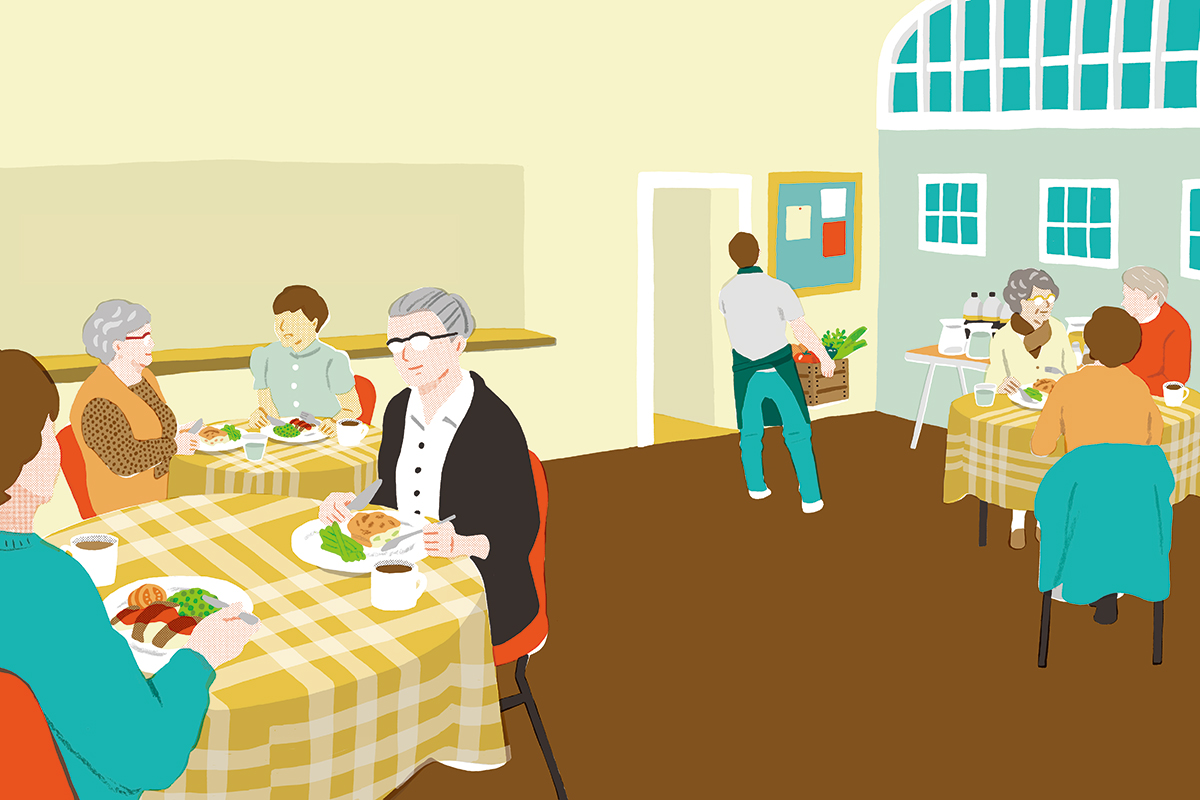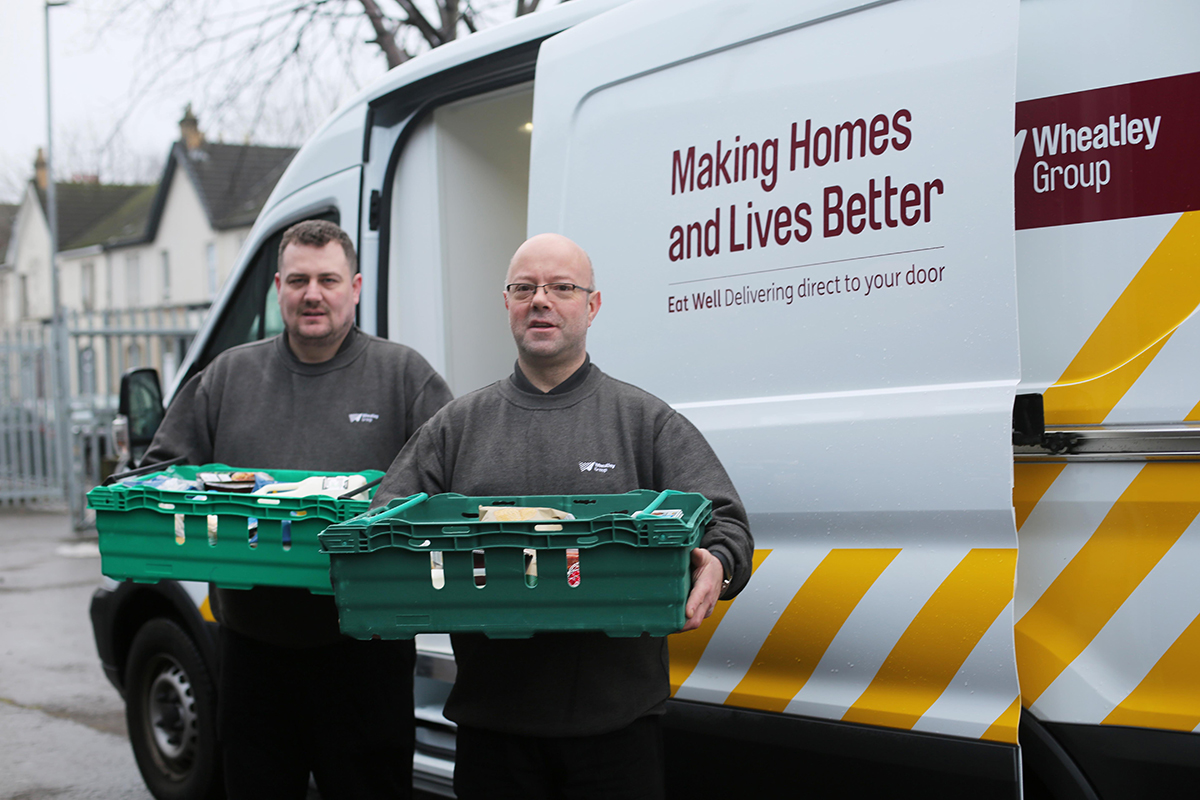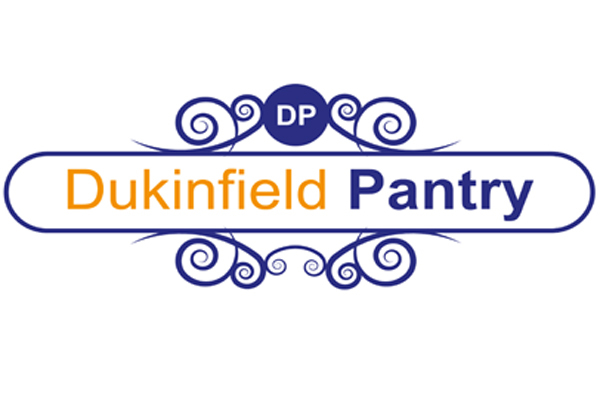You are viewing 1 of your 1 free articles
Helping to combat food poverty and social exclusion
Eating a meal with others gives more than daily sustenance – it also provides a social lifeline. Simon Brandon finds out what social landlords are doing to help Picture by Asako Masunouchi
Today, as she does every Tuesday morning, 95-year-old Nancy Smith catches two buses to get from her bungalow to Woodvale, a sheltered housing scheme on the outskirts of Nottingham, to join three friends for lunch.
On the menu today is a choice of gammon in parsley sauce or chicken and leek pie, followed by a selection of puddings. It is all fresh, cooked on the premises, and available to residents and guests alike for just £2.50.
“The food is always good,” says Ms Smith. “I go to another place [to eat] on Thursdays, but the food there is horrible – it’s frozen. It’s reliably fresh here.”
The food is provided by an organisation called Super Kitchen, which sources and delivers surplus food from supermarkets to locations across the East Midlands once a fortnight. Woodvale – a scheme with 48 flats and five bungalows owned by 38,000-home Metropolitan – is a perfect location for Super Kitchen to set up.
A kitchen originally served residents a three-course lunch, but budget cuts several years ago left it unused – except for reheating ready meals.
These Tuesday lunches are just one example of how social landlords are using food to improve the quality of their residents’ lives. They are doing so in ways that reflect the variety of roles food plays, both physiologically and socially – as fuel, as a foundation for health and well-being, and as a way to bring people together.
Social landlords are becoming involved because food poverty is on the rise and impacting their tenants. The Trussell Trust, which operates 428 food banks in the UK, gave out 587,700 packages of emergency food supplies between April and September 2017, a rise of 13% on the previous year.
In Glasgow, Wheatley Group has set up its own emergency food package delivery service for struggling tenants (see box: Eat Well).
Residents of New Charter Homes in an area of Manchester in which food poverty has been identified as an issue, have with their landlord’s help, set up a shop that sellssurplus food from local supermarkets at a huge discount (see box: Dukinfield Pantry).
And in Cardiff, Hafod Housing Association has been helping to ensure primary school children from low-income families can enjoy a healthy lunch during the summer holidays (see box: Food and Fun).
Eat Well
“We knew that our tenants were under severe financial pressure because of welfare reform and many faced a choice between either buying food or paying bills,” says Lorraine McLaren, director of Wheatley Foundation, the charitable arm of Wheatley Group, whose subsidiaries include Glasgow Housing Association. “That’s why Eat Well started.”
Each week, Eat Well’s staff and volunteers deliver about 100 bags of food to Wheatley tenants living in Glasgow. The programme is funded by the foundation and costs around £100,000 a year. The scheme also creates useful points of contact with vulnerable residents, Ms McLaren points out, because staff offer help and advice as well as food.
Since the project was piloted in April 2014, it has delivered food parcels to around 2,000 people. One of those is Gavin (not his real name): “My brother died last year and I had to go to his funeral in England. The cost of that meant I fell behind with my rent. Soon after that I had a heart attack and I wasn’t fit to work. I’d been a bus driver… I was on Universal Credit and had to survive on £250 a month.
“My housing officer knew I was struggling for cash because I wasn’t working. Eat Well was one of the ways that she helped me.”
Gavin adds: “It was difficult to accept the help at first… I got over the embarrassment, though. I’d been to food banks before. It’s a fact of life for many people these days.
“The food is delivered every week – things such as milk, fish, sausages, cheese, yoghurt and bread. It’s a worry off my mind. I still have to buy food, but this is an emergency supply, so at least I know I have something there.”
He concludes: “It’s a cracking idea, and it’s helping the people who really need it. It’s vital if you’re hard up – and lots of people are. I hope I can return to work soon, but I’m grateful for the support.”
A major factor behind the demand for these kinds of services is the rising price of food. According to the Office for National Statistics, the average cost of food and non-alcoholic drinks rose by 4% during the year to October 2017.
Those on fixed incomes will feel the increase particularly sharply.
At Woodvale, the lunchtime diners certainly appreciate the value. “It’s good food and it’s value for money,” says resident Michael Wheatley.
Dukinfield Pantry
In early 2016, a group of residents from the Dukinfield Central Estate in Greater Manchester raised their concerns about the amount of food that is being wasted in the UK with their landlord, New Charter Homes. Seven million tonnes is thrown away by households annually, according to the Food Standards Agency.
“They wanted to bring some of that food to help the community,” says Linda Whyatt, a community engagement officer at New Charter Homes.
The result is the Dukinfield Pantry. Open twice a week, it operates from a small unit, owned by New Charter and leased to the project for a peppercorn rent, in the middle of the estate.
The pantry’s users pay a subscription of £2.50 per week, for which they receive around £15 of groceries made up of surplus fresh and frozen food, as well as household items, from local supermarkets.
New Charter supported the scheme financially for the first six months, paying for equipment and stock.
“There’s lots of paperwork involved – insurance, premises, risk assessments – and we supported them with that, too,” says Ms Whyatt. Today the pantry is self-sufficient and generates a profit, which is plowed back into the scheme.
“I’ve been coming every week since it started.”
His friend and fellow diner Reg Evans is equally effusive. “You get a two-course meal for £2.50 – it’s a bargain. The portions are good, too. And it’s all tasty food,fresh and properly cooked. The best value anywhere.”
Sarah Hudson is the manager at Woodvale; a trained chef, she also runs the kitchen. For her, the biggest benefit of the Tuesday lunches is social inclusion, not just tackling hunger.
“It makes a huge difference to our residents,” she says. “Some may not see anyone from one Tuesday to the next. And several of the residents help out, so it gives them a chance to do something rather than just sitting in their flat. It’s incredibly beneficial to their health and well-being.”
Food and Fun
For low-income families with young children, the summer holidays can be an extra burden.
Research published last year by The Trussell Trust, the UK’s largest network of food banks, found that an additional 4,412 three-day emergency food parcels were given to families with children in July and August 2016 – that is, in the school summer holidays – than in the preceding two months.
The charity also found that half of all children who were helped by food banks are of primary school age.
In 2015, the Welsh Local Government Association launched a scheme called the School Holiday Enrichment Programme, or SHEP, known more colloquially as Food and Fun.
Hafod Housing Association, a Cardiff-based 4,500-home landlord, has been involved in the Food and Fun project in the St Mellons area of the city since its inception.
“Food and Fun has allowed us to tackle some very real concerns around school holiday hunger during the summer break,” says Sally Cockerill, Hafod’s head of community investment and chair of the St Mellons Food and Fun partnership. As well as day care and physical activities for local primary school-aged children, the scheme also provides breakfast and a hot lunch.
Hafod contributes £1,000, but more importantly, says Ms Cockerill, her organisation contributes its organisational skills and local contacts.
“We bring a range of local partners to the table, which have included Sport Cardiff and voluntary sector bodies, as well as services available as part of Cardiff Council,” she says.
Hafod has also offered practical support: designing and printing publicity materials, for example, as well as helping promote the scheme locally.
Woodvale pays £1,800 a year to Super Kitchen for fortnightly deliveries. The kitchen feeds 25 people each Tuesday lunchtime, and for supper every third Thursday. The scheme turns a profit – of £1,200 in its first year – which is reinvested into Woodvale.
The chicken and ham pie, it should be noted, is delicious, and comes in an enormous portion.
“I won’t need to eat again today,” says Mr Evans. As the dining room empties, we leave Ms Smith sitting in the adjoining common area, enjoying a postprandial chat with her dining companions while she waits for the bus to take her home.














